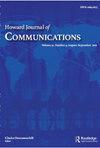Portrayals of the Black Lives Matter Movement in Hard and Fake News and Consumer Attitudes Toward African Americans
IF 0.8
Q3 COMMUNICATION
引用次数: 2
Abstract
Abstract Our study examined the relationship between media portrayals of the Black Lives Matter (BLM) movement in hard and fake news in varying media modalities (print versus video) and participant attitudes toward African Americans. We also examined sociodemographic factors that may be related to susceptibility of fake news. Participants were primed with either hard or fake news (print or video) prior to completing the online questionnaire. Participants included 385 college students from a large southeastern public university. The findings revealed a direct effect of fake news on attitudes toward African Americans but only if the news was from a printed media modality. Hard news also had a positive impact on participant attitudes if from a printed media modality. These findings may help explain why information learned via fake news is persistent over time. Biological sex and political affiliation were associated with the impact of media priming on participants, with male and Republican participants being more susceptible to the effects of fake news. The results of this study should be helpful to those involved in policy making regarding social media and fake news and are timely considering that the BLM movement is growing stronger and the increase in fake news is ongoing.硬新闻和假新闻对黑人生命也重要运动的描述以及消费者对非裔美国人的态度
摘要本研究考察了不同媒体形式(印刷与视频)的硬新闻和假新闻中对“黑人的命也是命”(BLM)运动的媒体描述与参与者对非裔美国人的态度之间的关系。我们还研究了可能与假新闻易感性相关的社会人口因素。在完成在线问卷之前,参与者被灌输了真实或虚假的新闻(印刷或视频)。参与者包括来自东南部一所大型公立大学的385名大学生。研究结果显示,假新闻对人们对非裔美国人的态度有直接影响,但只有在新闻来自印刷媒体的情况下才会如此。硬新闻也对参与者的态度产生积极影响,如果来自印刷媒体形式。这些发现可能有助于解释为什么通过假新闻获得的信息会随着时间的推移而持续存在。生理性别和政治立场与媒体启动对参与者的影响有关,男性和共和党参与者更容易受到假新闻的影响。这项研究的结果应该对那些参与社交媒体和假新闻政策制定的人有所帮助,并且及时考虑到BLM运动正在变得越来越强大,假新闻正在持续增加。
本文章由计算机程序翻译,如有差异,请以英文原文为准。
求助全文
约1分钟内获得全文
求助全文
来源期刊

Howard Journal of Communications
COMMUNICATION-
CiteScore
2.70
自引率
10.00%
发文量
23
期刊介绍:
Culture, ethnicity, and gender influence multicultural organizations, mass media portrayals, interpersonal interaction, development campaigns, and rhetoric. Dealing with these issues, The Howard Journal of Communications, is a quarterly that examines ethnicity, gender, and culture as domestic and international communication concerns. No other scholarly journal focuses exclusively on cultural issues in communication research. Moreover, few communication journals employ such a wide variety of methodologies. Since issues of multiculturalism, multiethnicity and gender often call forth messages from persons who otherwise would be silenced, traditional methods of inquiry are supplemented by post-positivist inquiry to give voice to those who otherwise might not be heard.
 求助内容:
求助内容: 应助结果提醒方式:
应助结果提醒方式:


